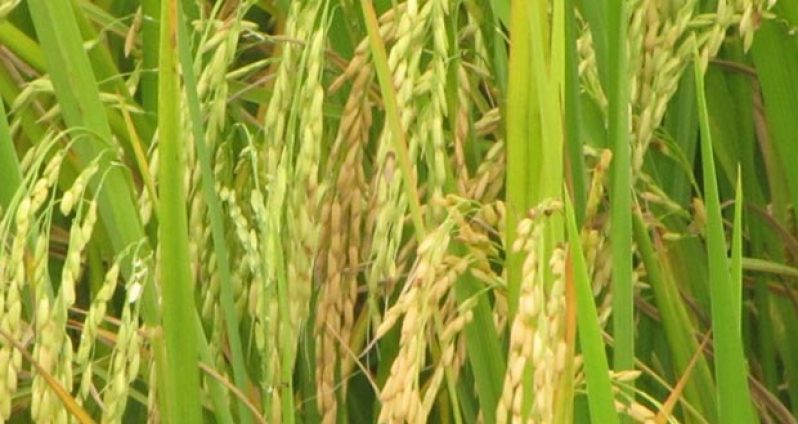Agriculture Minister, APNU Region 5 MP disagree
THE rice sector was the focus of the Budget 2014 debate on Wednesday night when A Partnership for National Unity (APNU) Member of Parliament (MP) Jennifer Wade, representing Region 5(Mahaica/Berbice), disagreed with Agriculture Minister, Dr. Leslie Ramsammy on some issues.

“There is a crisis in the rice sector. All is not well,” she claimed, calling for an aggressive marketing strategy to cater to the consistently increasing production in the industry.
But Minister Ramsammy pointed out that Government is doing its part to open up new markets.
“As for marketing, in 2008 we exported 196,000 tons. Last year we exported 395,000 tons, almost twice as much. We are doing our part. As a Government we have been opening up new markets even though rice is purely a private sector business,” he pointed out.
Guyana has already commenced shipping to Haiti, which is taking some 60,000 tons, as compared to only 1,000 tons last year. It began shipments, as well, of 4,000 tons to Belize.
“By any standard, the work we have done to improve our exports is impressive…in the last four years our exports have increased by 100 per cent,” Ramsammy said.
Three-pronged strategy
He said his Ministry’s approach to improving access to markets is centred on a three-pronged strategy, increasing the market share in countries that have agreements with Guyana; re-entering old markets where the country once had a meaningful presence; and securing new markets.
Wade told the National Assembly that some $300M is owed to farmers, a statement that was disputed by the Minister.
“Rice is on shaky ground, Government must meet its responsibility; farmers need protection,” the APNU MP stated.
She questioned the presence of a payment plan to support farmers.
“There is no proper plan for the rice sector,” Wade maintained.
However, Ramsammy said:“No farmer is owed for paddy at this time. The Government ensured that all farmers were paid to the tune of $370M. The millers now owe the Government.”
Following meetings with farmers and millers in the rice producing regions, an agreement was struck to have the ministry facilitate payments to the farmers.
Ramsammy explained that the Ministry is in a position to make the payments because the millers who owe farmers are suppliers to the Venezuelan market and, once shipping to the neighbouring country commences, the monies paid will be recouped.
Payment challenge
The payment challenge was due, in part, to concerns over the stability of Guyana’s rice trade agreement with neighbouring Venezuela, which were put to rest after Minister Ramsammy assured that there are no problems with the market.
The deals with Venezuela were concluded and ships are being arranged to move the rice and paddy from Guyana to that country. The rice importing authority in Venezuela concluded the purchase orders and shipping schedules to begin shipments last week.
Guyana and Venezuela have agreed on the amounts and price for Guyana’s paddy and rice and, based what was agreed, this country expects to ship close to 200,000 tons at a price that is similar to last year’s.
The Minister added that, as it relates to the prices being paid to farmers, continued engagements with millers resulted in an agreement to pay above $3,000 per bag, a price that was set, initially, due to the delayed conclusion of the Venezuela rice deal, which was impacted in some ways by the ongoing political unrests in the neighbouring nation.
He said:“Price control is not an issue that has much support among our people. But Government is willing to listen to proposals in this regard although it is difficult to only introduce price control for rice.”
Minister Ramsammy emphasised the fact that Guyana is competing with a set world market price and does not have much influence on changing those prices.
Rice varieties
The APNU MP also honed in on the work of the Burma Rice Research Station and charged that the new rice varieties being developed to aid in climate change resilience, among other things, are not available to farmers.
“The Government has to recognise the plight of farmers,” she said.
Wade alleged that only some farmers are deriving benefit from the new varieties.
The Agriculture Minister emphatically rejected that notion, stating that the Research Centre has produced more new varieties in the last five years.
One new variety, GRDB 10 is now used in 35 percent of the fields while other new varieties are utilised in more than 90 percent of them.
“The Research Station has come a long way over the years and its work, coupled with investment and farmers’ input have seen the industry propelling…it is the hope of the Government to continue to work with the Research Station through GRDB to have the station evolve by incorporating new techniques,” Ramsammy said.
He said one of the focal issues in agriculture is climate change and, cognisant of its effects, the developments of new rice varieties are necessary.
Climate change impacts negatively on the availability, stability, access and utilisation of food security and, according to Minister Ramsammy, the development of rice varieties which are blast resistant and have high milling qualities can be not only beneficial to millers and farmers, but the industry as a whole.
“Food security is the most vulnerable and, as such, it is important that we (Government) continue to push for the right varieties of rice to be developed; hence the reasons for pushing for climate smart agriculture,” he said.
Ramsammy said the GRDB has also incorporated the use of the six-point practice which has proven successful with farmers across the rice growing regions.
The six improved crop management practices include date of planting, density, treatment of seeds, weed control, fertilisation and water management. Those techniques fall under the Agriculture Ministry’s programme of having farmers adopt proper farm husbandry.



.jpg)








